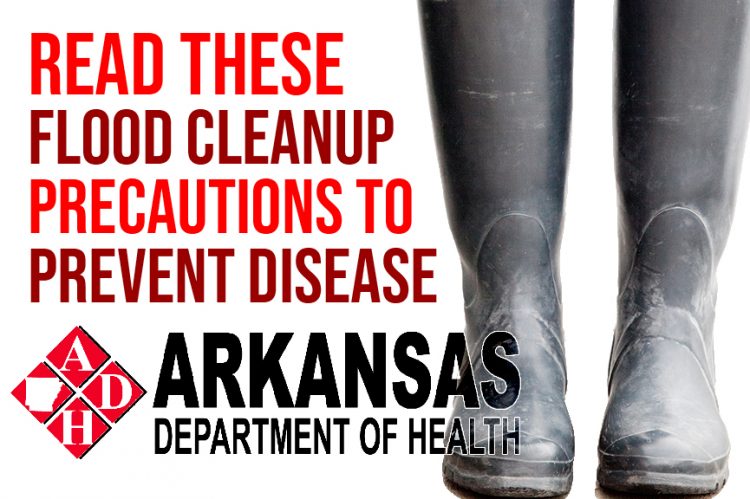As residents and volunteers clean up after flooding in the state, the Arkansas Department of Health (ADH) urges anyone involved in clean up to be aware of the health risks. Flood water and sewer overflows can contain bacteria, viruses and other organisms that cause disease.
Basic Precautions
These basic precautions and cleaning tips for your home can help to keep you safe and healthy:
- Avoid skin contact with flood water, and keep cuts and sores clean and covered.
- Do not allow children to play in flood water.
- Do not eat or drink anything exposed to flood water.
- Wash hands frequently.
- Contact your local health unit for information about septic system inspection.
Mold
Things that are wet for two or more days, including carpets and rugs, often have mold growing on them, even if you can’t see the mold. Mold can make the air in your home unhealthy and affect people with asthma, allergies or other breathing problems.
- Get rid of any contaminated objects that cannot be thoroughly cleaned.
- Wash contaminated surfaces and objects with warm, soapy water and disinfect with a bleach and water solution made of one cup of bleach per one gallon of water. Home or laundry disinfectant can be used for objects that would be damaged by bleach.
- Do not use ammonia. Ammonia vapors mixed with bleach vapors create a poisonous gas.
Private Well Water
Private wells impacted by flooding will need to be tested for total coliforms and E. coli, which are indicators of bacterial contamination in drinking water.
- Do not drink water from a well until it has been disinfected and tested.
- Do not turn on the pump before consulting with an electrician, as there is a risk of electrical shock.
- The ADH Public Health Laboratory is waiving well water testing fees for private well owners impacted by the flood. Contact your local health unit for information about well water testing.
Tetanus
Due to the likelihood of a debris-related injury after a flood, it is recommended that all responders and residents make sure that they are up-to-date with the tetanus shot. The Centers for Disease Control and Prevention (CDC), recommends the diphtheria, tetanus, and acellular pertussis vaccination (DTaP for those younger than seven; Tdap or Td for those seven years or older) across the lifespan:
- Infants and children should receive five doses of DTaP by the time they reach six years of age.
- Adolescents should receive a single dose of Tdap between 11 and 12 years of age.
- Pregnant women should receive a single dose of Tdap during every pregnancy.
- Adults should receive a single dose of Td every 10 years.
- Adults who are eligible to receive a Td, but have never had a Tdap, should receive a Tdap.
- If you receive a wound, you should still see your doctor as other medicines or treatment may be needed.
Tetanus vaccines are available at Local Health Units and in many doctor’s offices and pharmacies.
There is a Local Health Unit in every county, and a listing can be found at: https://www.healthy.arkansas.gov/health-units. If you are unsure whether you are up-to-date with tetanus vaccination, you should be able to confirm that information with the provider who administered the vaccine. If you are unable to confirm whether you are up-to-date, it is safe to get another shot.
For more information, please visit the Flood Water Safety page on the ADH website at www.healthy.arkansas.gov.



